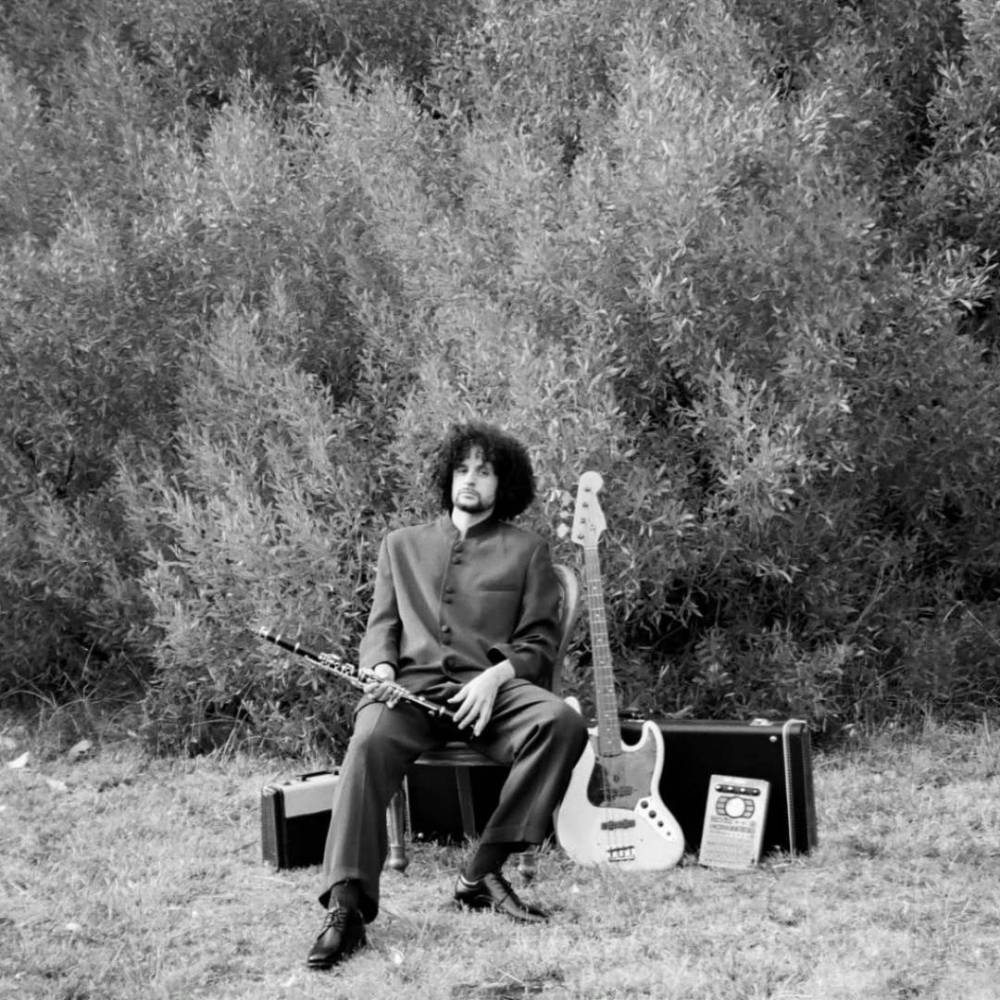Image via @_detigre / Rhys Langston/
Kevin Crandall still misses Rudy Gobert in a Utah Jazz jersey.
With a clarinet atop his recording desk and a gaggle of guitars to his right, rapper-producer Rhys Langston details to me the slow learning curve he’s gone through with each instrument that litters his studio. For an accomplished musician whose latest record, Pale Black Negative, includes original compositions on acoustic guitar, banjo, bass, clarinet, electric guitar, percussion, and synthesizer learning to play has been a slow march: “Playing instruments is not very intuitive for me.”
Langston learned the clarinet by just guessing through the fingering until he could play tones clear enough to chop up for beats. No music theory. No outside instruction. Just feeling and grit. This unstructured approach helped shape his perspective as a “genre abolitionist.” When Rhys began producing at the height of 9th Wonder-era boom bap revivalism, the LA polymath declared that, “straight up, I’m too fucking weird for this,” and took a hard left turn, instead conjuring up woodwind-driven beats like “Resident Harebrain” to prop up his rhymes. His noodling has served him well across dozens of projects wherein he established himself as peerless.
The twentieth musical project of Rhys Langston’s career, Pale Black Negative, is a leviathan from the creative depths of a great artistic mind. It’s the realization of both his instrumental exploration and the genre abolition he’s been pushing towards his entire career. On Bandcamp, Langston tagged the project genre as “post-intellectual”—a designation whose only other members are a tape of six electronica “Nightmare Worlds” and a project that has borderline incoherent spoken word over piano titled, among other things, “Lil Uzi Can’t Ride the Rollercoaster.”
Rhys’ post-genre pursuit is at its apex on Pale Black Negative’s best three-track run, starting with “When the Orchestra is Dreaming.” To start, Langston whips out a Beastie Boys-esque singing voice to flout his hard-earned clarinet and bass skills. Then, the Ishmael Reed-inspired “It Jes Grew (Right Outta Me)” kicks in with a knee-slapping banjo lick as Langston raps about smuggling okra seeds. He then stitches in recordings of friends talking about their hair and rips off a sung refrain of “it jes grew” while the aforementioned clarinet chops dance in the periphery. “Chancla Gander (a Spiritual for Moziah)” ends the triplet with perhaps the most intimate track the LA artist has released over his 20 projects. Through a series of chants over disparate drum fills, Langston pays homage to his cousin Moziah, a brotherly figure who shaped his approach to life and kickstarted his first sample library.
The release of Pale Black Negative has also been a charge for Langston amidst the grim government-sanctioned kidnappings and subsequent protective uproar that has ripped through the city he calls home. Langston recently penned a piece for the Los Angeles Review of Books titled “A Week Occupied by ICE, or How Close Does the Violence Become,” reflecting on his personal experience during the week that LA became the flashpoint for the ICE raids that continue to devastate communities across the US.
When we spoke, Rhys detailed to me the hesitation he had in releasing Pale Black Negative while LA was surging in defense of its people. Reaching out to friends and family for advice, Langston ultimately decided to go ahead, using the energy of this album release to fuel the commitment and action he reckons with in the article.
I caught up with Rhys a couple days after Pale Black Negative dropped. We chatted about the album, his reverence for genre abolition, and the peculiar history behind his learning to play the clarinet.
(This interview has been condensed and lightly edited for clarity.)

